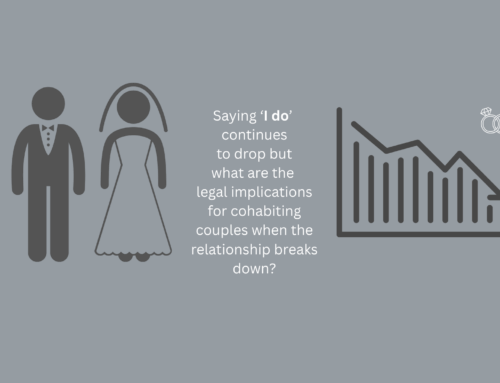If you’re separated from your spouse, you might be moving on in any number of ways. A new partner and relationship may well be one of them.
Whether you’re recently separated, have been living apart from your spouse for some time, or are in the middle of divorce proceedings, it’s a good idea to understand how a new relationship might affect the lay of the land regarding your divorce and any resulting financial settlement. Let’s take a look.
What is a ‘new partner’?
While this may seem like a fairly obvious question, when you enter into a new relationship with a divorce on the horizon, it’s important whether or not you and your new partner are considered to be living together or intend to do so. It is, therefore, an issue of cohabitation. However, a new relationship may also be relevant if your new partner is financially supporting you.
The case of Kimber v Kimber laid out some clear guidelines for what constitutes cohabitation in circumstances such as these. Questions to be considered include:
- Is there evidence to suggest that cohabitation is taking place in the opinion of the ‘reasonable person with normal perception’?
- Are you living together in the same household?
- How permanent is the relationship?
- Does how you handle your finances as a couple indicate how serious the relationship is?
- Does your new partner have a relationship or bond with any children you have from your marriage?
- What are your intentions for the relationship? Do you intend to live together?
Depending on the answers, you may well be considered to be cohabiting with your new partner, which could have consequences for any financial settlement.
Will a new partner affect the financial settlement?
The answer to this question depends on your circumstances. While a new relationship will impact some situations, it won’t impact others. If this is an issue in dispute, the court will consider things like how long you’ve been in a relationship, how stable the relationship is, including whether you are or have any plans to live together or marry, whether you contribute to each other financially and whether your new partner’s assets and income are modest or otherwise.
The court will also consider whether or not there are enough assets and income in the existing marital pot to meet the needs of you and your ex-spouse without considering those of your new partner.
Full and frank disclosure
During your divorce, you’ll need to provide what’s known as ‘full and frank disclosure’ about your financial and other relevant circumstances and what they’re expected to look like in the future. This involves disclosing any new relationship and whether or not you’re living together or intending to do so in the not-so-distant future. You may also need to provide information about your new partner’s finances, so far as this is known to you.
It’s crucial to be honest during this process, as if you fail to do so, the court could reject any proposed financial agreement. Ultimately, if you’re sharing finances with a new partner, and either of you is financially supporting the other, then this may be taken into consideration, and it may impact your financial settlement.
Other things to consider
Entering into a new relationship before your divorce is finalised can be a contentious issue for many separating couples, leading to tension and prolonged negotiation. Aside from the finances, several things should be considered to help things run smoothly.
The children
If you have children from your marriage, be open and honest about any new relationship, and most importantly, don’t leave it to the children to break the news to your former spouse.
Bear in mind that your ex may want to know a little more about your new partner to ensure the children are safe and happy. Although they can’t prevent you from moving on, your ex-spouse may request certain boundaries, and if you can, so far as these are reasonable, they are probably worth considering in the interests of everyone involved.
Try to go at a reasonable pace
When you separate from your spouse, you’re fully entitled to move on with your life and a new relationship. However, it’s always worth ensuring you’re emotionally ready to do so. If you have any children, you’ll need to ensure they’re prepared to have a new person in their life, too.
If you’re already thinking about getting married again, be aware that you cannot do this until your divorce is finalised.
Cohabitation agreement
With cohabitation on the rise here in the UK, investing in a cohabitation agreement is a wise move – especially if you have assets you need to protect in case of a separation. If you intend to marry your new partner, the same consideration should be given to a prenuptial agreement.
In such circumstances, seeking independent expert legal advice is vital and will help you make the right decisions for you and your future. If you’d like to discuss any of the things mentioned in this blog, or you’d like further information about cohabitation or prenuptial agreements, why not book your free consultation now? We’re always here to help.






